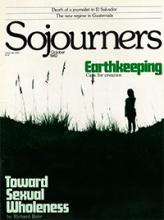Don't push me 'cause I'm close to the edge
I'm trying not to lose my head.
It's like a jungle sometimes it makes me
wonder
How I keep from going under.
From "The Message" (Sugar Hill Records)
Every summer there seems to be one song that dominates the atmosphere in our mostly black, low-income neighborhood. You hear it drifting out of apartment windows, booming over street-corner gatherings, and blasting from a tape deck on the bus. Usually it is some high-spirited chant about the pleasures of love, dancing, or general good times. But in this second year of the Age of Reagan, good times are getting harder to come by, even in popular song.
This summer the song that held sway over the inner-city streets was "The Message" by Grandmaster Flash and the Furious Five. "The Message" is done in the current "rap" style, which consists of couplets recited in a sing-song voice over a rock-steady funk instrumental backing. It is a style that originated among the street kids of the urban ghettos. With "The Message," rap comes home with a vengeance as the young men of the Furious Five run down the cold-blooded horrors of ghetto life with a desperation that is made even more fearsome by its lack of hyperbole.
Read the Full Article

